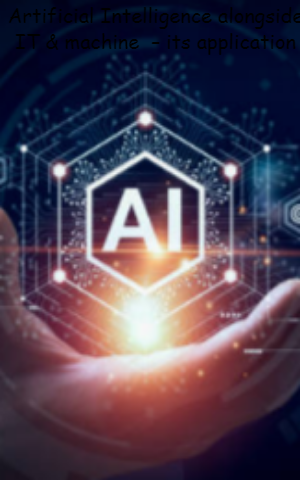Artificial Intelligence Alongside IT & Machine – Its Application
Artificial Intelligence Alongside IT & Machine – Its Application


After the discovery of Information Technology, it was found that the world changed with a new method of storing, retrieving, and communicating information on a large scale. The term "Information Technology," in its modern sense, first appeared in a 1958 article published in the Harvard Business Review. In this article, authors Harold J Leavitt and Thomas L Whisler commented that “the new technology does not yet have a single established name. We shall call it – Information Technology.
After the development of information technology and its practices, people were gaining so many benefits that it has become a part and parcel of our everyday life.
Then, the research of the human mind and technology went simultaneously, inventing a new term, “Artificial Intelligence,” which is the science and engineering of making intelligent machines, especially computer programs. It is related to the similar task of using computers to understand human intelligence, but AI does not have to confine itself to methods that are biologically observable.
Decades before, the birth of the artificial intelligence conversation was denoted by Alan Turing, by his work ”Computing machinery and intelligence,” which was published in 1950. In this publication, the question came – can a machine think? From there, he offered a test known as the “Turing Test,” where the issue of machine and human brain came together in the intelligence field. However, A.I. works as a text summarizer, and it is a process that analyzes data sets repeatedly to find associations and interprets meaning from useful data. Neural networks operate like networks of neurons in the human brain, allowing AI systems to take in large data sets and give answers to any questions related to them.
The globe has been changing drastically since the last decade in data science, information technology, space research, medical science, agriculture, and whatnot. The National Aeronautics and Space Administration (NASA), USA, has been exploring the unknown things in the air and space relentlessly.
ISRO's moon mission, Chandrayaan -3, achieved the landings of Vikram on the surface of the moon’s near side (facing the earth), near the south pole on August 23, 2023. It is a great achievement for Indian scientists. It may be recalled that through untiring efforts of ISRO’s astronauts, India could land on the Moon, in addition to three other countries.
Lastly, on January 19, 2024, Japan became the fifth country to put a spacecraft on the moon (Times of India reports dtd.20.01.2024).
Now, we find Artificial Intelligence is approaching towards media and even in tapping human intelligence to gain an edge in the intelligence wave. It is believed that acquiring new skills such as the adoption of automation, A.I., and machine learning will increase as the rate of adoption accelerates.
The world of work has seen unprecedented changes, and technology has been at the forefront of new ideas. The growth of digital transformation, combined with the new age of human talent configuration, has been shaping up the WorkCentre needs of the future. In 2024, we will continue to see many changes because of large-scale digital natives and organizational policies. The impact of automation, A.I., machine learning, etc., will be seen more than ever as the rate of adoption accelerates. Here are some examples we can cite:
Network service: Today, even ordinary people know the proceeds of G-pay, any transaction, ticket booking, etc., sitting at home through mobile or laptop. This is a great change in the transaction of money and it will reduce fraudulence.
A.I. application will amplify work and gig economy: A.I. and automation will see large-scale integration into several aspects of human resource management. Apps for every operational event, continuous churning of data for drawing and placing talents as per the requirements of the organizations. In this method, organizations will continue to show ease in accommodating diverse work, workers, and workplace preferences. We will also see a borderless talent economy with a multitude of opportunities, especially in meeting skilled workers, semi-skilled workers, and talent managers.
In music also, A.I. will shape the future. In an interview with the Times of India, jazz legend Herbie Hancock, who came to India for a performance, explained the use of A.I. in music. He, notwithstanding a great pianist, still razor-sharp with his wit, continues to shape global music. About artificial intelligence, he said, “it is very exciting, a little bit puzzling and there are also some fears. Because, very often, along with the good is the possibility of bad. I believe A.I. is a child of humanity right now.” He also narrated that parents should be careful in growing the thinking of children. But he lamented that artificial intelligence though in its infant stage will grow in every field, including music, but one has to see about things not turning out well with A.I. But hopefully, ultimately it will improve and be a great boon.
It is reported that Former NDTV CEO, Pranoy Roy started a new website and apps ‘Decoder,’ which will broadcast total reporting via A.I. It is expected to start functioning before the next Lok Sabha election to be held in April-May 2024 (Reference Anandabazar Patrika dtd. 15.01.2024).
From its infant stages, artificial intelligence is gradually expanding its branches and twigs in information technology, business, culture, tradition, and even in medical science. Artificial Intelligence will be a good subject of study for aspiring students.























































